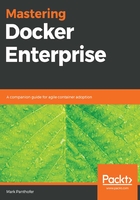
Running Docker Engine-Community on AWS or Azure
Please note there are AWS and Azure quickstart packages for cloud users. These convenience bundles include a Docker-supported AMI/VM image, as well as cloud utilities to wire up and support a cluster of Docker Engine-Community nodes. The real assets here are cloud provider-native IaaS templates (AWS CloudFormation or Azure resource manager), Docker VM images, and Docker4x utility containers for interacting with the cloud provider's services. For instance, the AWS bundle allows you to include the cloudstore volume plugin, where instead of using local EBS volumes, you can use EFS and S3 backed volumes across the entire cluster.
Finally, please note that Docker for AWS and Docker for Azure only apply to Docker Engine-Community installations. Docker Enterprise now uses the Docker certified infrastructure tooling, using Terraform and Ansible to target VMware, Azure, and AWS implementations of Docker Enteprise.